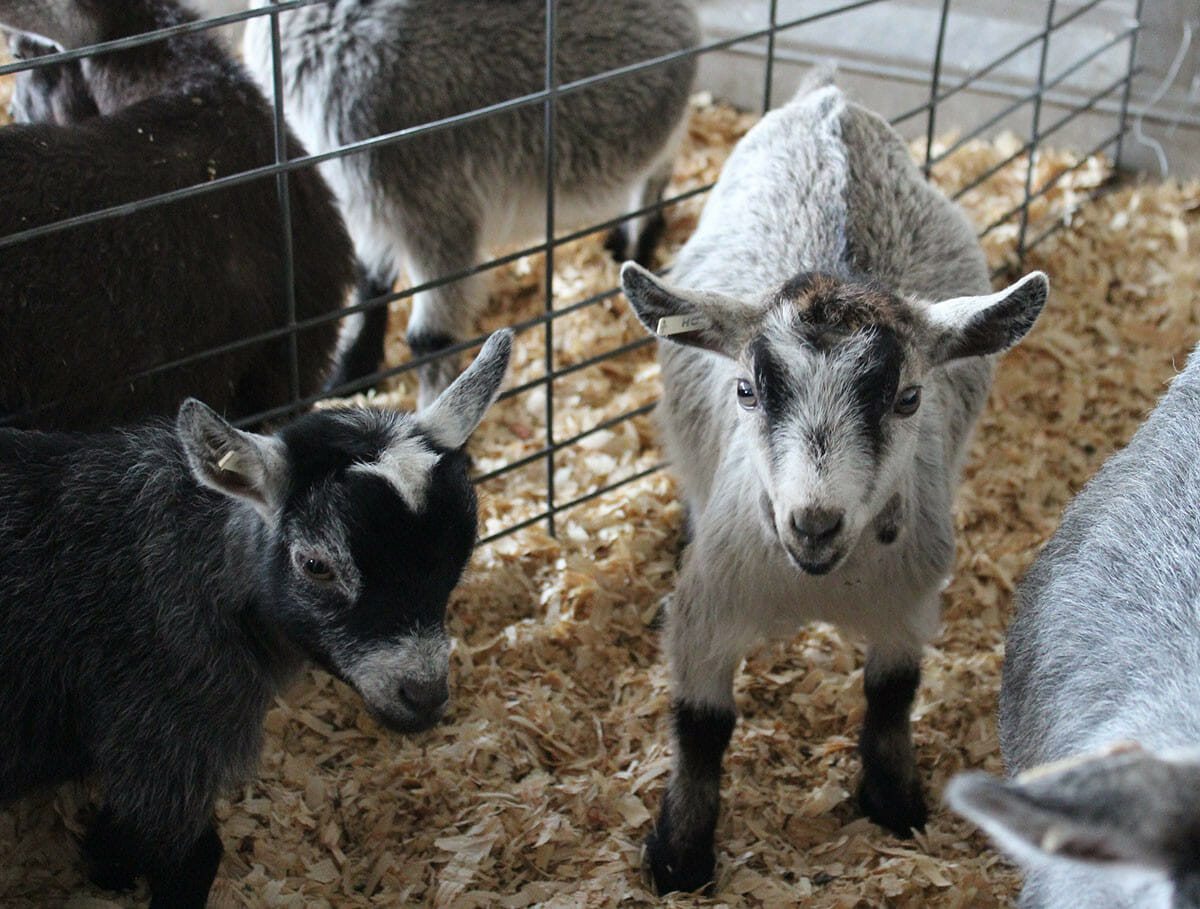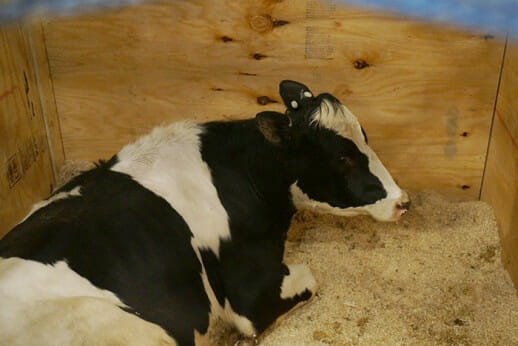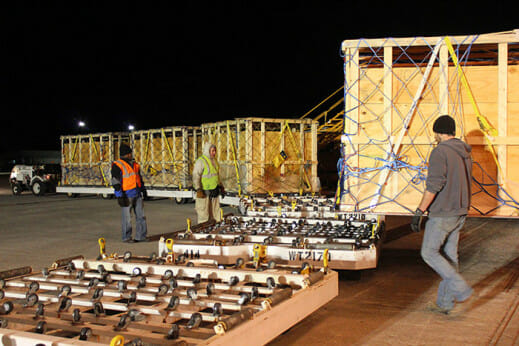Pregnant Pygmy Goats and International Travel
When you’ve got 20 pregnant pygmy goats that just absolutely, positively have to get to Kuwait, your newest option for flying them out of the Unites States is in the heart of Ohio.
Pregnant Pygmy Goats and International Travel
When you’ve got 20 pregnant pygmy goats that just absolutely, positively have to get to Kuwait, your newest option for flying them out of the Unites States is in the heart of Ohio.

You may never have that issue, but Larry Baker has. He’s the livestock coordinator for TLT Silver Tiger Logistics, part of an international service provider based in Frankfurt, Germany. He was in charge of getting the goats to their new home in Kuwait and chose to fly them out of Rickenbacker International Airport, 10 miles outside of Columbus. Rickenbacker is the latest airport to join a select group in the country approved by the United States Department of Agriculture for international livestock transport.
According to Bryan Schreiber, who works for the Columbus Regional Airport Authority, there are only about 20 airports in the continental U.S., Hawaii and Puerto Rico where livestock can be flown out of the country. Considering there are nearly 550 commercial service airports in the country, your options can be fairly limited for getting livestock out of the U.S.

Schreiber, the manager for business development and air cargo, says it was a one-and-a-half-year process to get approval. It involved coordinating with several federal agencies, and satisfying a number of criteria, from having certified inspection and quarantine stations nearby (the airport has two within an hour’s drive) to proving they had the facilities to safely handle the animals at the airport.
“We reactivated the water, heat and fire alarm systems in a large hangar that had previously been vacant,” Schreiber tells Modern Farmer in an email. “Other than that, we already had the appropriate equipment, scales and staffing in place to do the job very efficiently.”
The airport received approval Dec. 31 and has had two shipments so far. The first was in March and involved 176 pregnant cows that were sent to Thailand. The latest, in June, involved the pregnant pygmy goats. Both shipments of animals arrived safely and without incident. More shipments are in the works, according to Schreiber.
Baker says they chose to work with Rickenbacker for several reasons, including convenience, and, most importantly, because as a smaller, cargo-dedicated airport, it’s relatively quiet and stress-free compared with larger airports.

“Our main goal is to get away from the large hubs, such as Chicago and JFK (in New York City), because it increases the stress on the animals and we want to eliminate as much stress as we can,” he says in a phone interview. “They’re loaded on and it’s a minimal amount of confusion. With Chicago, or JFK, you haven’t seen confusion like the confusion there.”
Considering the logistical issues involved in transporting live animals to other countries, such as U.S. and international regulations and health protocols, the less confusion, the better.
“Everyone you deal with will be different. Before you start, you have to know what the rules are or you can’t play the game. It’s really complicated,” says Baker. “I’ve been in this business for 25 years and I’ve never had a shipment go without a problem. But there’s never been anything that couldn’t be worked through by communication and cooperation.”
Baker, who is in Greenville, Ohio, about one-and-a-half hours from Rickenbacker Airport, usually deals with clients outside the United States looking to improve their livestock’s genetics by importing American animals – mostly cattle, pigs and goats, as well as horses, but sometimes the cargo is a bit more exotic.
“We’ve transported snakes, frogs, lizards, rabbits, and of course the deer – that was a little bit on the different side,” he says.
The deer he is speaking of were white-tailed deer that were shipped to Russia. He was told they were going to a game farm.
He says he is hoping Rickenbacker becomes “the place to ship livestock out in the Midwest and even Canada. It’s just as close and a lot less hassle to come to Rickenbacker,” he says.
Follow us
This work is licensed under a Creative Commons Attribution-NoDerivatives 4.0 International License.
Want to republish a Modern Farmer story?
We are happy for Modern Farmer stories to be shared, and encourage you to republish our articles for your audience. When doing so, we ask that you follow these guidelines:
Please credit us and our writers
For the author byline, please use “Author Name, Modern Farmer.” At the top of our stories, if on the web, please include this text and link: “This story was originally published by Modern Farmer.”
Please make sure to include a link back to either our home page or the article URL.
At the bottom of the story, please include the following text:
“Modern Farmer is a nonprofit initiative dedicated to raising awareness and catalyzing action at the intersection of food, agriculture, and society. Read more at <link>Modern Farmer</link>.”
Use our widget
We’d like to be able to track our stories, so we ask that if you republish our content, you do so using our widget (located on the left hand side of the article). The HTML code has a built-in tracker that tells us the data and domain where the story was published, as well as view counts.
Check the image requirements
It’s your responsibility to confirm you're licensed to republish images in our articles. Some images, such as those from commercial providers, don't allow their images to be republished without permission or payment. Copyright terms are generally listed in the image caption and attribution. You are welcome to omit our images or substitute with your own. Charts and interactive graphics follow the same rules.
Don’t change too much. Or, ask us first.
Articles must be republished in their entirety. It’s okay to change references to time (“today” to “yesterday”) or location (“Iowa City, IA” to “here”). But please keep everything else the same.
If you feel strongly that a more material edit needs to be made, get in touch with us at [email protected]. We’re happy to discuss it with the original author, but we must have prior approval for changes before publication.
Special cases
Extracts. You may run the first few lines or paragraphs of the article and then say: “Read the full article at Modern Farmer” with a link back to the original article.
Quotes. You may quote authors provided you include a link back to the article URL.
Translations. These require writer approval. To inquire about translation of a Modern Farmer article, contact us at [email protected]
Signed consent / copyright release forms. These are not required, provided you are following these guidelines.
Print. Articles can be republished in print under these same rules, with the exception that you do not need to include the links.
Tag us
When sharing the story on social media, please tag us using the following: - Twitter (@ModFarm) - Facebook (@ModernFarmerMedia) - Instagram (@modfarm)
Use our content respectfully
Modern Farmer is a nonprofit and as such we share our content for free and in good faith in order to reach new audiences. Respectfully,
No selling ads against our stories. It’s okay to put our stories on pages with ads.
Don’t republish our material wholesale, or automatically; you need to select stories to be republished individually.
You have no rights to sell, license, syndicate, or otherwise represent yourself as the authorized owner of our material to any third parties. This means that you cannot actively publish or submit our work for syndication to third party platforms or apps like Apple News or Google News. We understand that publishers cannot fully control when certain third parties automatically summarize or crawl content from publishers’ own sites.
Keep in touch
We want to hear from you if you love Modern Farmer content, have a collaboration idea, or anything else to share. As a nonprofit outlet, we work in service of our community and are always open to comments, feedback, and ideas. Contact us at [email protected].by Andrew Amelinckx, Modern Farmer
July 13, 2015
Modern Farmer Weekly
Solutions Hub
Innovations, ideas and inspiration. Actionable solutions for a resilient food system.
ExploreExplore other topics
Share With Us
We want to hear from Modern Farmer readers who have thoughtful commentary, actionable solutions, or helpful ideas to share.
SubmitNecessary cookies are absolutely essential for the website to function properly. This category only includes cookies that ensures basic functionalities and security features of the website. These cookies do not store any personal information.
Any cookies that may not be particularly necessary for the website to function and are used specifically to collect user personal data via analytics, ads, other embedded contents are termed as non-necessary cookies.